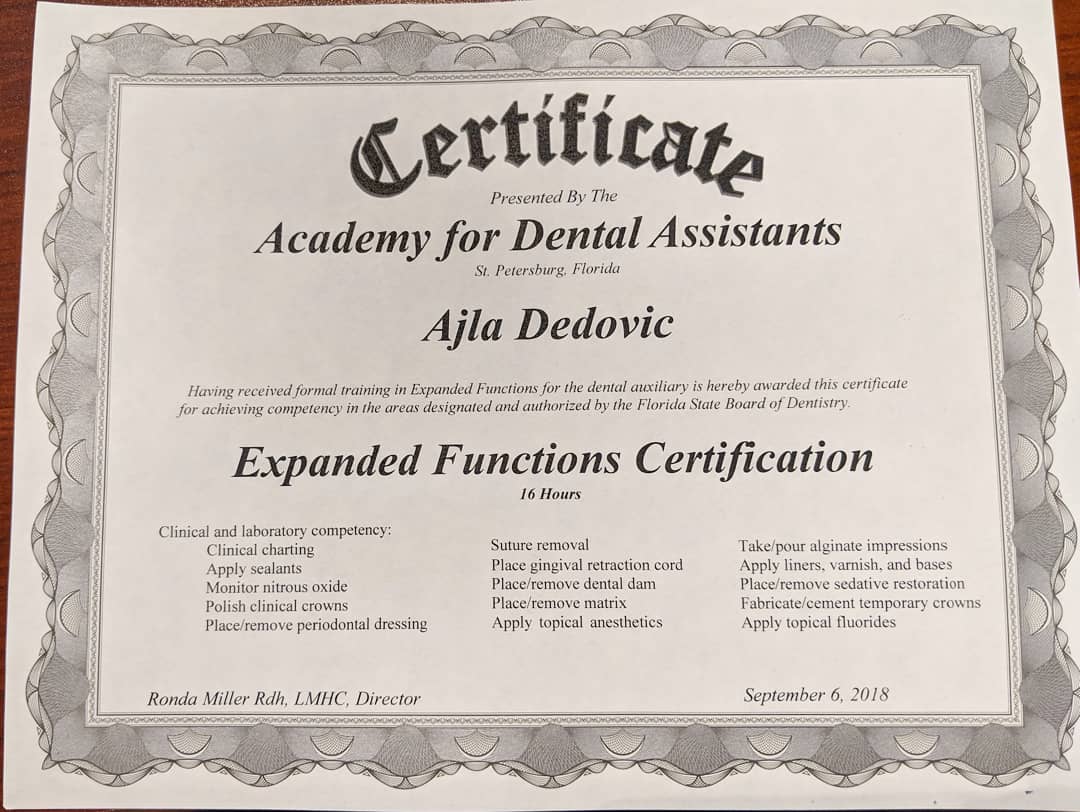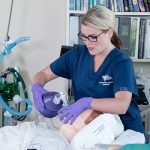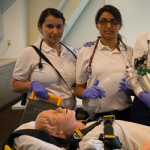What is a Dental Assistant?
Both clerical work and dental procedures may be on the list of things to do as a Dental Assistant.
Working in this field means that you may be scheduling appointments or taking x-rays of a patient’s teeth.
Consider a Dental Assistant the right-hand man (or woman) to the dentist.
Helping others and focusing on oral health is a major goal in this career.
In order to be successful in this career, you should have knowledge of x-rays, medical terminology, and basic dental procedures.
Duties
There are many duties that a Dental Assistant may have to do throughout the workday.
Some of the tasks that you can expect to do as a Dental Assistant include:
- Preparing the exam room
- Sterilizing equipment
- Taking and processing x-rays
- Doing lab work
- Greeting costumers and checking them in
- Updating and maintaining records
- Assisting with procedures
- Performing some dental procedures
Salary
The average salary for a Dental Assistant is about $38,660 a year in the United States.
Dental Assistants who have higher education and certification will likely make more salary.
The highest salary for a Dental Assistant is $59,540 a year.
That’s not to be expected when just beginning your journey as a Dental Assistant.
Most novice Dental Assistants make closer to $29,580 a year to begin.
Gaining hands-on experience and working with a variety of patients will grant you opportunities for higher pay and promotions.
The population of the area in which you work can also have an effect on your pay scale.
For example, Dental Assistants working in California make $43,000 a year, while those working in Idaho make about $34,000 a year.
Annually National Average Salary: $48,860
Average Annual Salary by State
| State | Avg. Annual Salary |
|---|---|
| Alabama | $39,600 |
| Alaska | $54,720 |
| Arizona | $50,040 |
| Arkansas | $40,730 |
| California | $53,570 |
| Connecticut | $51,540 |
| Delaware | $47,110 |
| District of Columbia | $57,390 |
| Florida | $46,670 |
| Georgia | $45,510 |
| Hawaii | $42,130 |
| Idaho | $42,710 |
| Illinois | $47,170 |
| Indiana | $49,590 |
| Iowa | $49,020 |
| Kansas | $42,490 |
| Kentucky | $45,720 |
| Louisiana | $41,450 |
| Maine | $54,190 |
| Maryland | $50,410 |
| Massachusetts | $56,790 |
| Michigan | $45,990 |
| Minnesota | $63,680 |
| Mississippi | $40,160 |
| Missouri | $45,390 |
| Montana | $45,930 |
| Nebraska | $46,300 |
| Nevada | $47,320 |
| New Hampshire | $52,850 |
| New Jersey | $50,570 |
| New Mexico | $42,290 |
| New York | $49,850 |
| North Carolina | $49,270 |
| North Dakota | $54,720 |
| Ohio | $50,960 |
| Oklahoma | $42,980 |
| Oregon | $57,690 |
| Pennsylvania | $49,760 |
| Rhode Island | $51,700 |
| South Carolina | $45,890 |
| South Dakota | $49,080 |
| Tennessee | $46,680 |
| Texas | $42,520 |
| Utah | $40,260 |
| Vermont | $54,570 |
| Virginia | $47,900 |
| Washington | $56,140 |
| West Virginia | $39,280 |
| Wisconsin | $49,240 |
| Wyoming | $43,740 |
| Guam | $34,850 |
| Puerto Rico | $24,660 |
| Virgin Islands | $37,250 |
Annual Average Salary: Top 5 States
The top earning state in the field is Minnesota, where the average salary is $63,680.
These are the top 5 earning states in the field:
* Employment conditions in your area may vary.
How to Become a Dental Assistant
Step 1 Enter a Program
Even though it is not legally required to earn any formal education, the options for Dental Assistants are abundant.
Some trade schools and community colleges offer a one-year program for Dental Assistants.
There are some Associate’s degree programs that are available for people who want to get into dentistry.
Through a community college or university, Dental Assisting can be a great major to look into.
The courses to take when considering an Associates degree in Dental Assisting include:
- Oral Anatomy
- Radiography
- CPR and First Aid
- Dental Pharmacology
- Office Administration
These types of programs are unique from one-year programs because they will typically require students to take part in an internship or externship, as well as clinical lab work.
Step 2 Become Certified
The certification and licensing process in your state could be different than in another state, so please contact your local licensing board to be sure that you know all of the requirements.
If you live in a state that requires certification, the Dental Assistant National Board offers the Certified Dental Assistant examination.
The exam is 320 questions and consists of topics like:
- Radiation health and safety
- Dental assisting procedures
- Administrative procedures
- Infection control
In order to pass the exam, you must score at least 400 of the 900 available points.
Other certifications that can lead to promotions and raises as a Dental Assistant are:
- Orthodontic Dental Assistant
- Preventative Functions Dental Assistant
- Restorative Functions Dental Assistant
All three of these certifications are provided by the Dental Assistant National Board as well.
Step 3 Gain Experience
During your educational program, there should have been a time when you worked an internship or externship to gain experience.
If not, there are other ways to gain experience as a Dental Assistant.
Once you graduate from a program, you can work in a clinic volunteering your time, or at dental drives through schools or state offices.
Having experience will make it easier to gain promotions and raises in this career and will show employers that you can do the job effectively.
In order to gain more responsibility as a Dental Assistant, two years of experience is typically required.
Some of the areas to gain experience are:
- Chairside assisting
- Oral anatomy
- Oral hygiene
- Dental pharmacology
Step 4 Further Your Career
Having an Associate’s degree as a Dental Assistant is just the first step into the world of dentistry.
Working your way up the ladder through education and experience can lead you to a career as a Dental Hygienist.
After earning an Associate’s degree, many colleges will allow credit transfers so that it may only take around two years to finish a Bachelor’s degree.
With a degree in Dental Hygiene, it is likely that you will learn more science, math, and anatomy.
Other courses that you can expect in a Bachelors degree program are:
- Medical Ethics
- Pathology
- Radiography
- Patient Management
- Periodontics
It’s possible that once you become a licensed and experienced Dental Hygienist, you can move on to becoming a Dentist after earning more degrees.
Popular Programs
Education
Even though you have teeth, and you’ve taken care of them all of your life, you still need to earn an education to work with other people’s teeth.
For a Dental Assistant, there are a couple of options to choose from.
Some Dental Assistants decide to work through a one-year program, earning a certificate.
These can be found online and in classrooms through training schools and community colleges.
Most one-year programs will teach basic hands-on training for Dental Assisting, but won’t provide much more than entry-leave knowledge.
A typical choice for Dental Assistants is to earn an Associate’s degree.
This type of degree can take about two years, offers an externship, and will provide more opportunities within the career.
When looking for a program, it’s important that you find one accredited through the Dental Assistant Certification Board.
The average Associate’s degree program has courses focused on science and math, as well as the following:
- Chairside Assisting
- Dental Radiography
- Public Health
- Dental Materials
- Oral Anatomy
- CPR and First Aid
If you are the type of person who wants to become a Dental Assistant as a stepping stone to further your career in dentistry, you may even be interested in earning a Bachelor’s degree.
Most accredited Bachelor’s degrees will take another 2-4 years, and can provide promotions and raises, including working as a Dental Hygienist.
In this career, you will have more responsibilities and a higher pay scale.
Some of the types of information that you will learn through a Bachelors degree program are:
- Taking dental x-rays
- Equipment sterilization
- Health promotion and disease prevention
- Clinical hygiene
- Records management
- Oral surgery
Once you gain the proper education and have at least two years of experience as a Dental Assistant, you can think about gaining certification or becoming specialized in order to hone your career.
Video About The Career
Certification and Licensing
Every state in the United States has different requirements in order to work legally as a Dental Assistant.
The Dental Assistant National Board has all of the information on their website.
The typical requirements per state to gain certification are:
- Graduation from an accredited program
- Completion of a background check
- Passing the exam
Becoming licensed by the state means that you will need to pass an exam in order to gain credentials.
This is different than the ones offered by the DANB, so check your local dental assistant association.
The Dental Assistant National Board offers five certifications:
- National Entry Level Dental Assistant
- Certified Dental Assistant
- Certified Preventative Functions Dental Assistant
- Certified Restorative Functions Dental Assistant
- Certified Orthodontic Assistant
Each certification comes with its own requirements as well.
Let’s take a look at the National Entry Level Dental Assistant certification.
This is the most basic type of credential, meaning that you will be certified to do entry-level tasks as a Dental Assistant.
Moving up the ladder, there is the Certified Orthodontic Assistant and the Certified Dental Assistant certifications.
The Orthodontic Assistant certification requires experience working with braces and other orthodontic procedures.
While the Certified Dental Assistant credential requires experience with chairside assisting.
The Certified Restorative and Preventative Functions Dental Assistant certifications are the for the most experienced Dental Assistants.
Each of these certifications costs around $245 to apply for, and you must pass an exam before gaining the credential.
The topics covered on the National Entry Level Dental Assistant exam include:
- Sealants
- Impressions
- Temporaries
- General chairside assisting
- Anatomy
While the exam for the Certified Restorative Functions and Preventative Functions Dental Assistants typically have those topics as well as more advanced ones including:
- Morphology and physiology
- Infection control
- Coronal Polishing
- Preventing cross-contamination
- Safety standards and guidelines
Having a certification isn’t required in most states, however, it does show employers and patients that you are competent in your career.
Certification Example:

Average Training Program Duration: 1-2 Years
The typical training program to become a Dental Assistant takes around one year to finish.
This can include online classes or in-person classes, but be sure to do all of your clinical work and lab work in person to gain hands-on experience.
Some training schools and online workshops hold training courses to become a Certified Dental Assistant.
These can take as little as 8 weeks and as much as 16 weeks and will allow you to obtain a certification.
Longer training programs typically provide an externship as well.
Job Outlook
Over the next ten years, Dental Assistants all over the United States should not find difficulty in pursuing a career.
That is because this career will grow by around 11 percent, which is much higher than many other careers in the medical field.
However, it is on par with most dental careers, due to the increase in oral health importance over the last several decades.
Those working in larger populations with higher socioeconomic statuses will likely find more career opportunities as a Dental Assistant.
Earning certifications and gaining experience will also open many more doors in this profession.
Employment Growth Projection: 8%
2023
2033
That's a higher than average projected growth of 31,500
Should You Become a Dental Assistant?
Overall Satisfaction: High

Most Dental Assistants feel that they are helping people and making their patients’ lives better.
This makes the job more meaningful, thus making it quite satisfactory.
Those who have certification will likely find more satisfaction in their career than those with no formal education or credentials.
This is because the career opportunities open up for those with knowledge and experience.
It seems that this career has good work to home life balance, where a Dental Assistant can work a typical 9-5.
Average Salary: Medium

Most Dental Assistants in the United States make $38,660 a year on average.
To begin your career, you should expect an average salary of around $29,580 a year.
After the experience, certifications, and specializations, it’s possible to make over $59,540. a year as a Dental Assistant.
Working in large populations or populations with higher socioeconomic statuses will likely provide a higher salary.
Dental Assistants working in areas like Washington DC and California make over $43,000 a year, while Dental Assistants in Idaho and New Hampshire are likely to make closer to $34,000 a year.
Job Growth Outlook: High

The field of Dental Assisting will rise by around 11 percent over the next decade.
This is on track with other careers in the same field, as dental work and oral health have become more popular.
Dental Assistants will be necessary to help Dentists with routine procedures, x-rays, and other time-saving tasks.
The baby boomer generation is also growing older, which means that there will be more need for medical intervention in the near future.
Having a career as a Dental Assistant can be very optimistic, and will continue to be that way for a long time.
Education Duration: 1-2 Years

It’s important to become educated in this career because no one wants a Dental Assistant who doesn’t know what they are doing.
Many Dental Assistant programs can take anywhere from one year to 18 months to complete.
However, the most popular type of education for Dental Assistants is an Associate’s degree.
This takes about two years to finish and can lead to earning a Bachelor’s degree.
For those looking to expand their career, even more, a Bachelor’s degree can take anywhere from 2-4 years to finish beyond the Associate’s degree.
Personal Skills Needed

To be a successful Dental Assistant, of course, you need to have dental knowledge and customer service skills, but you should also have:
- Organizational skills
- Detail-oriented mentality
- Ability to multitask
- Ability to use hands
- Good hand-eye coordination
- Professionalism
- Ability to work as a team or alone
- Strong communication skills
- Empathy
- Ability to handle stressful situations
- Compassion
- Critical thinking skills
- Reliability
- Strong work ethic
Often times, patients may be afraid or anxious at the dentist’s office, it’s important that a Dental Assistant can help to calm them and make the experience less frightening.
Frequently Asked Questions
How much does a Dental Assistant make?
Since you can become a Dental Assistant without much education, the starting salary is around $29,580 a year.
However, once you gain a certificate or Associate’s degree, it’s likely that you will make closer to the average salary of $38,660 a year.
Through more education and certifications, the chances of promotions and raises go up, as does your salary-capping at $59,540 a year for Dental Assistants.
Working in areas with larger populations and higher socioeconomic statuses will allow for a higher salary as well.
How long does it take to become a Dental Assistant?
There aren’t any educational requirements to get a job as a Dental Assistant, but most employers require some type of education.
Typically, Dental Assistants either work through a one-year program, or they earn an Associate’s degree that takes two years to finish.
Either path you choose is fine, as long as it gives you the chance to get some hands-on experience in the assisting chair.
To gain more education, Dental Assistants can earn Bachelor’s degrees, which can take another 2-4 years.
What does a Dental Assistant do?
Dental Assistants’ main job is to make sure that the patient is taken care of, and that the dentist has everything they need to perform procedures.
A Dental Assistant may check patients in and take x-rays, they may also provide small dental procedures like applying fluoride.
Some of the other daily tasks of a Dental Assistant may include:
- Filing paperwork
- Contacting insurance companies
- Cleaning and sterilizing equipment
- Applying sealants to patients’ teeth
What is the demand for Dental Assistants?
In the past several years, it seems that there has been an increase in the importance of oral health.
This trend will continue to grow, as will the career of Dental Assistants.
Along with other careers in the field of dentistry, the need for Dental Assistants will grow by around 11 percent over the next decade.
Another reason for this increase is that the baby boomer population is growing older, which means more medical attention will be necessary.
How much does it cost to become a Dental Assistant?
The cost to become a Dental Assistant depends on the type of education you choose.
A one year program can cost less than an Associate’s degree.
Most one-year Dental Assistant programs cost anywhere from $2,500 to $5,000.
The typical Associate’s degree costs about $10,000 to $15,000 depending on the community college or university attended.
All in all, it can cost anywhere from $2,500 to $15,000 to become a Dental Assistant.
 Dental Assistant Info by State
Dental Assistant Info by State

- Alabama
- Alaska
- Arizona
- Arkansas
- California
- Colorado
- Connecticut
- Delaware
- Florida
- Georgia
- Hawaii
- Idaho
- Illinois
- Indiana
- Iowa
- Kansas
- Kentucky
- Louisiana
- Maine
- Maryland
- Massachusetts
- Michigan
- Minnesota
- Mississippi
- Missouri
- Montana
- Nebraska
- Nevada
- New Hampshire
- New Jersey
- New Mexico
- New York
- North Carolina
- North Dakota
- Ohio
- Oklahoma
- Oregon
- Pennsylvania
- Rhode Island
- South Carolina
- South Dakota
- Tennessee
- Texas
- Utah
- Vermont
- Virginia
- Washington
- West Virginia
- Wisconsin
- Wyoming
Dental Assistant Resources
- 14 Pros and Cons of Being a Dental Assistant
- Dental Assistant Requirements for State Licensure and Registration
- Dental Assistant vs. Medical Assistant
- Expanded Functions Dental Assistant: Duties, Certification, Training and Salaries
- How Hard is Dental Assisting School?
- How Much Does a Dental Assisting School Cost?
- On-The-Job Training vs. Dental Assisting School
- Online Dental Assistant Training Programs
- What is a Dental Assistant?
More Medical Careers
| Career | |
|---|---|
 | Certified Nursing Assistant Working as a Certified Nursing Assistant is an entry-level role that will give you hands-on experience when you are ready to take the next step in your medical career. |
 | Dental Hygienist Dental hygienists take care of cleaning teeth to promote hygiene and help avoid cavities and gum problems. |
 | Dialysis Technician Dialysis technicians maintain and monitor dialysis equipment, and also act as primary caregivers for patients undergoing dialysis treatment. |
 | Dog Groomer Dog groomers attend to grooming dogs, usually at dog salons or big pet-related chain stores. |
 | Healthcare Administrator Healthcare administrators – also known as healthcare executives or health services managers – are responsible for the planning, direction, and coordination of medical and health services. |
 | Home Health Aide Home health aides provide home care to individuals who require assistance in their day-to-day living. |
 | Licensed Practical Nurse (LPN) Licensed Practical Nurses provide basic nursing care to patients and work with Registered Nurses and Doctors. |
 | Medical Assistant Medical assistants support the work of physicians, nurses, and other health professionals. |
 | Medical Biller and Coder Medical billers and coders manage, organize, and code various health information data. |
 | Medical Technologist Medical laboratory technologists collect bodily samples and conduct tests to analyze those samples. |
 | Medical Transcriptionist Medical transcriptionists go over voice recordings to convert them into written texts. |
 | Nutritionist As a Nutritionist, you’ll be tasked with creating meal plans, counseling, and understanding dietary restrictions for all types of clients. |
 | Patient Access Representative The work involves helping people to orient themselves to the space and everything that is going on. |
 | Patient Care Technician Patient care techs work directly with patients helping them with daily activities and assist the medical staff by measuring and monitoring the patients' vital signs among other tasks. |
 | Pharmacy Technician Pharmacy technicians provide patients with medications through prescription or over the counter. |
 | Phlebotomist As a Phlebotomist, it will be your responsibility to take blood samples from patients and send them to the lab for further testing. |
 | Physical Therapist Assistant Physical therapist assistants provide physical therapy services to patients and aide to physical therapists. |
 | Professional Recovery Coach A professional recovery coach is a life coach who works with someone during their addiction recovery process. |
 | Radiation Therapist Allied health provisional who specializes in radiation oncology treatments. |
 | Registered Health Information Technician Registered Health Information Technician (RHIT) help store and verify accuracy of health records as well as analyze patient data. |
 | Registered Nurse (RN) Registered Nurses provide hands-on patient care in various settings, mainly hospitals, and clinics. |
 | Respiratory Therapist Respiratory therapists treat and care for patients who experience breathing difficulties. |
 | Sterile Processing Technician A sterile processing technician is a healthcare professional who is responsible for preparing, sterilizing, maintaining, packaging, and storing medical tools and equipment used in surgical and other medical procedures. |
 | Surgical Technologist Surgical technologists – also known as operating room techs – prepare operating rooms and assist doctors and nurses during surgical procedures. |
 | Vet Office Manager Veterinary office managers work to make sure that the daily operations run smoothly and efficiently at veterinary hospitals or veterinary clinics. |
 | Veterinary Assistant Veterinary Assistants work closely with Veterinarians to handle routine animal care. |
 | Veterinary Technician Veterinary Technicians assist veterinarians as well as diagnosing and treating animals, mostly in private clinics. |
 | EKG Technician EKG technicians test and monitor the cardiovascular system. |
 | EMT Trained emergency medical technician that arrives at the scene to provide medical services such as resuscitation. |
 | MRI Technologist MRI Technologists use a machine to scan the body and create a detailed image of the inside for doctors to analyze. |
 | Optician Opticians are technicians and salespersons at the same time who spends most of their day talking to customers, reading prescriptions written by doctors, and dispensing glasses and lenses. |
 | Ultrasound Technician Ultrasound technicians aid physicians in monitoring and diagnosing patients through the use of ultrasonic imaging technology. |
 | X-Ray Technician X-Ray Technicians are medical imaging professionals who use technology to visualize the inside of our bodies. |














